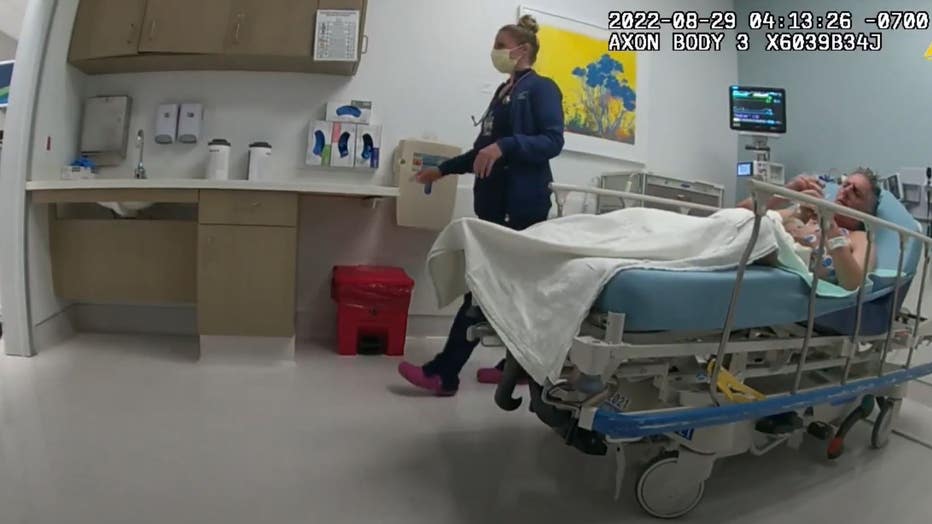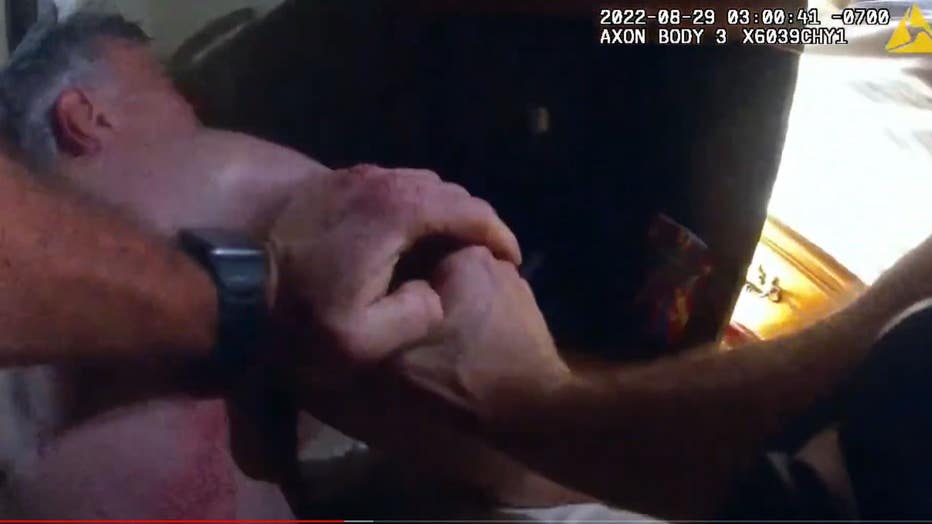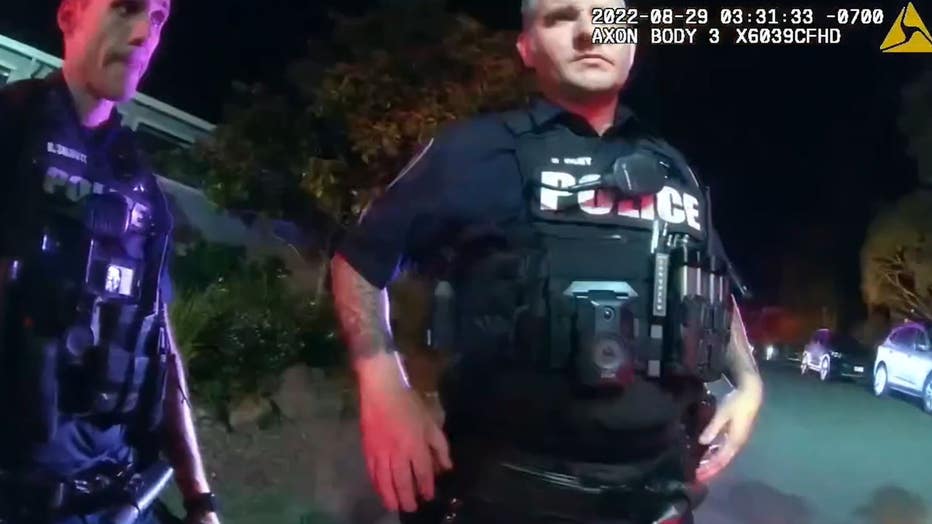San Anselmo man tased by police during medical seizure, alleges cover-up

Man alleges police cover-up after shocked with Taser
Bruce Frankel sued the Central Marin Police Authority after officers stunned him with a Taser and arrested him while he was having a grand mal seizure in his bedroom
SAN ANSELMO, Calif. - A San Anselmo man on Wednesday sued police after they stunned him with a Taser and arrested him while he was having a grand mal seizure in his bedroom – all captured on body camera video obtained by KTVU.
Bruce Frankel, 61, a financial planner, filed the suit in Marin County Superior Court against the Central Marin Police Authority alleging battery, false arrest and defamation. His lawsuit also alleges that police concocted a cover-up story, where officers falsely arrested him on bogus charges to justify what he describes as their use of excessive force.
Police Chief Michael Norton declined an opportunity to be interviewed, but in an email said that his department "regrets that Bruce Frankel has elected to pursue litigation against us for an alleged improper emergency medical response to him."
Norton added that his department "will vigorously defend itself against this meritless and factually inaccurate litigation. Unfortunately, this individual has decided to first litigate his case in the media rather than in court, where we are confident the action of our officers will be vindicated."
The suit raises the question about the quality of police training to assess medical emergencies and why handcuffs and a stun gun were used on a man who was suffering from a health crisis and had not been accused of any crime.
"If the police had just asked [my wife] Alice two questions, ‘What’s going on?’ and ‘Has this happened before?’ We wouldn’t be here today," Frankel told KTVU in an interview. "But that officer did not do that at all. He assumed he knew what was going on and attacked me."
WATCH: Body camera: Police officer uses Taser on man recovering from grand mal seizure
Frankel was diagnosed with epilepsy and was having a seizure when police entered his bedroom on Aug. 29, 2022.
"The tasing of someone who has just had a neurological event is extremely dangerous," Frankel said. "Part of what I want out of this is proper police training, how to identify these events. There are these types of issues going on around the country, especially in smaller departments."
Body camera: Police officer uses Taser on man recovering from grand mal seizure
This 11-minute video shows Central Marin Police Authority Officer Kevin Sinnott trying to handcuff and then tasing Bruce Frankel of San Anselmo, who was recovering from a grand mal seizure in August 2022.
An informal survey of several Bay Area cities by KTVU showed that police typically respond to medical calls, even when a crime is not alleged.
In big cities, like Oakland, police are dispatched because it's never clear if medical emergencies could also involve more dangerous elements. In smaller cities, like Piedmont, dispatchers receive all the police, fire and medical calls and send police to every call; it's up to the officers to use their discretion to determine whether they will respond.
The Central Marin Police Authority oversees the small Marin County towns of San Anselmo, Corte Madera and Larkspur.
Even if police officers show up for a medical call, Peters said that it's imperative they "lead with foresight, not force."
"The video tells the story," said Altair Law attorney Craig Peters, who filed the suit with attorney David Fiol of Brent and Fiol LLP. "There isn’t a whole lot more to know. We’re trying to hold people accountable for some really bad decision-making, which taints the entire department."
According to the suit, it was police officer Kevin Sinnott, the first officer on scene, who kicked off that bad decision-making.
On the morning in question, Frankel's fiancé, Alice Frankel, called 911 at 2:51 a.m., telling dispatchers that her husband wasn't breathing.
The officer's body camera video shows Bruce Frankel's son opening the door for Sinnott, who heads with a flashlight into Frankel's bedroom.
Frankel, who is emerging from his seizure, is mumbling and standing near his bed in his underwear. He is seen stumbling about and tripping into the drapes. The video then shows him falling onto the bed.
Sinnott, however, makes the assessment that Frankel is drunk, less than four seconds after entering the room, the video shows.
He does not ask Alice Frankel to tell him what happened, and Alice Frankel never specifically tells the officer that her husband is suffering a medical emergency. Her native language is French.
In an interview, Alice Frankel told KTVU that she was surprised a police officer showed up at all.
"I was expecting EMTs," she said. "But the police showed up first. He did not take any time to ask any questions whatsoever."
The video shows the officer grabbing Frankel and struggling on the bed.
It's obvious from the video that Sinnott feels scared and threatened, believing Frankel is purposely fighting him.
"Stop resisting," Sinnott says, panting. "Stop fighting. Get on your stomach. I want to help you. Stop fighting or you're going to get tased. Do you want to get tased?"
"Leave me alone," Frankel says several times. He is never seen actively pushing the officer, rather he is seen trying to get away from him.
"Stop. Baby. They're trying to help you," Alice Frankel repeats.
WATCH: Bruce Frankel questioned in hospital
As Frankel is seen shouting and moaning, Sinnott pulls out his Taser and shocks Frankel in his back in an attempt to get him into handcuffs.
Frankel drops to the ground, hitting his head on the furniture, hurting his nose.
Sinnott wrote in his police report, which KTVU reviewed, that Frankel had been actively resisting him for more than two minutes, and he used the Taser to get Frankel to comply with his orders. He wrote that he warned Frankel twice that he was going to Tase him and that he feared for his safety.
At 3:03 a.m., Cprl. Sean Fahey and Officer Kaitylyn Anderson showed up, along with three EMTs.
They helped Sinnott finish handcuffing Frankel, and they lifted him off the floor and onto the bed.
Officer Joel Heaps arrived five minutes later and told Alice Frankel that her husband had been trying to "fight" Sinnott, police reports show.
And that's when the cover-up story begins to unfold, the lawsuit alleges.
Alice Frankel disagreed and made it clear to Heaps that her husband had been trying to escape the police, not fight them, the lawsuit states.
As Frankel was being taken to the hospital, his lawyers allege that Sinnott "realized his use of force would be questioned and began to think of ways to cover up his misconduct."
Another body camera video shows Sinnott asking Fahey if he should "tag" Frankel with a three-day psychiatric hold.
Frankel's lawyers allege that this was the officers coming up with a "cover story" for him fighting with Frankel, as well as booking Frankel for resisting arrest, the suit alleges.
Fahey rejects both suggestions.
But then Heaps got involved and "refused to take no for an answer," the suit states. "Heaps, through persistent, suggestive questioning, undermined Fahey's authority and encouraged Sinnott to execute a 180-degree turn in his thinking."

Bruce and Alice Frankel discuss their lawsuit against the Central Marin Police Authority.
Police barred Alice Frankel from going into the hospital room with her husband, who was now under arrest on resisting and battery charges – if she had, she could have explained the background of his medical condition, the suit states.
"The officers not only deprived plaintiff's doctors of relevant information; they filled the vacuum with false information," the lawsuit alleges.
At about 9 a.m., a nurse gave Frankel hospital clothing and slippers and allowed him to leave.
Choking back tears, Frankel was led out of the hospital in handcuffs, despite a neurologist determining that he had indeed suffered a grand mal seizure.
Frankel was booked into the Marin County Jail and, since he couldn't remember his wife's phone number, walked in slippers half a mile to a gas station, the lawsuit states, where the employees helped him get a taxi home.
Some days later, Frankel received a report in the mail from the District Attorney that he was also being charged with domestic violence, which the lawsuit indicates was added "in an effort by the CMPA to reinforce the cover-up of defendant Sinnott's misconduct."
In his police report, Sinnott alleged that Frankel pushed his wife during the encounter, but there is no "push" ever seen on the body camera video. And if there had been domestic violence at the home, Frankel's lawyers said that Sinnott never followed any of that DV protocol required under California law.
"In short, Sinnott submitted a false statement to the Marin County District Attorney in the hope that plaintiff would be charged with a serious crime he did not commit," the lawsuit states.
Frankel spent $10,275 on a criminal defense attorney to fight those charges. Ultimately, the Marin County DA did not file any charges against Frankel, indicating its decision was final.
In December 2023, the police department promoted Sinnott to corporal.
Attorney Alison Berry Wilkinson represents four of the officers involved, and said that an internal review found their use of force justified.
"The allegations in the lawsuit against these officers bear no semblance to reality and are outrageous," she wrote to KTVU. "The officers who arrived on-scene to help in response to the medical call did an extraordinary job under very difficult circumstances."
According to the officers, Frankel presented symptoms that "mimicked someone under the influence. He was irrational, unstable, and violent. While we now know this was the consequence of a seizure, at the time the officers had no such information and acted in accordance with training, law and policy," Berry Wilkinson said.
She added that the officers involved wanted to make sure everyone was safe, but "using incredible strength, Mr. Frankel fought the officers’ efforts long and hard."
For his part, Frankel said his whole "psyche" has changed since this ordeal, and he's not holding his breath for the police to say they're sorry for what happened.
"They'll never apologize," he said.
He also can't bring himself to watch the video of what happened that day.
"I can't keep reliving this over and over again," he said through tears.

Bruce Frankel is diagnosed with a grand mal seizure in August 2022.

Police Cprl. Kevin Sinnott struggles with Bruce Frankel, who is having a grand mal seizure. Aug. 29, 2022

Central Marin Police Authority Cprl. Kevin Sinnott (left). August 2022

